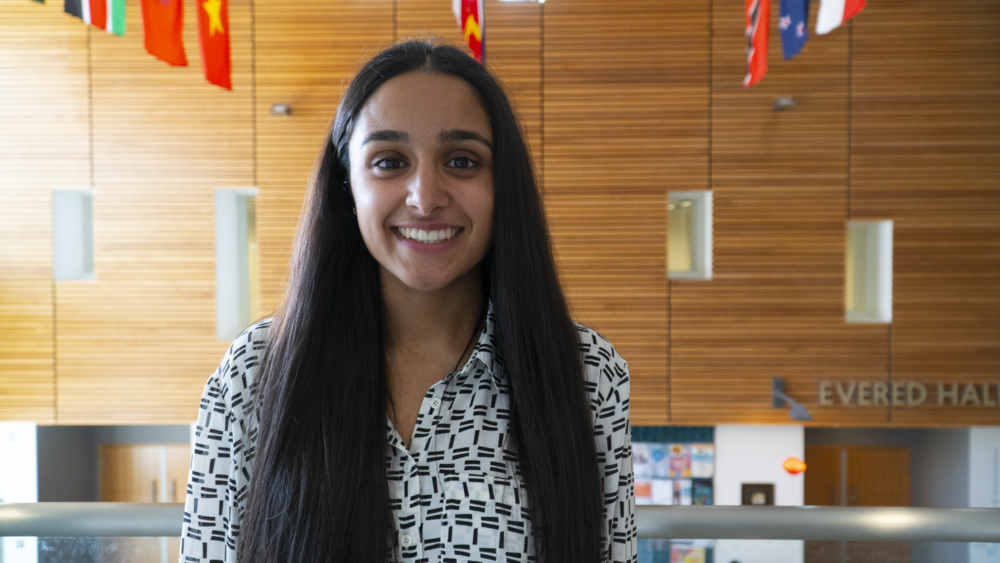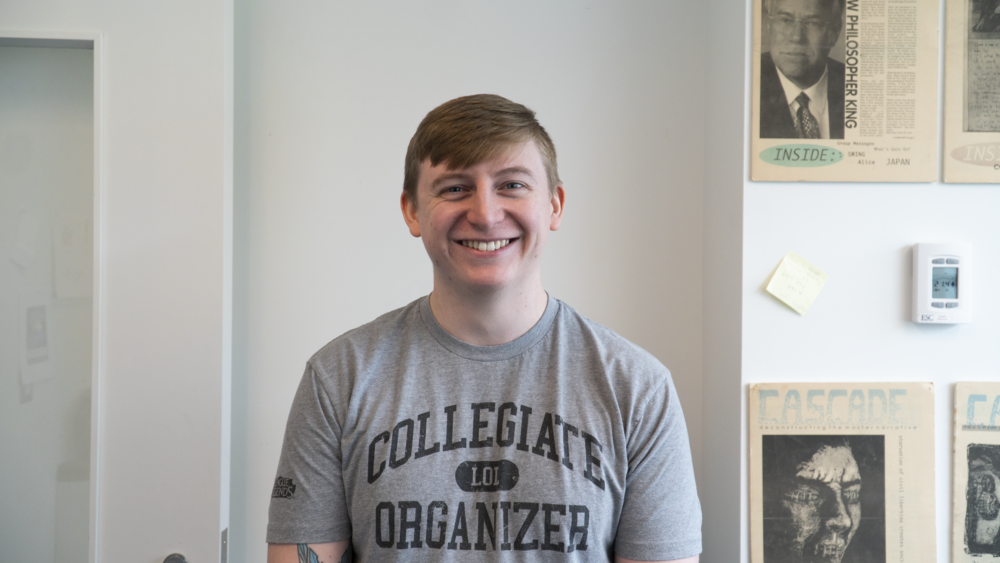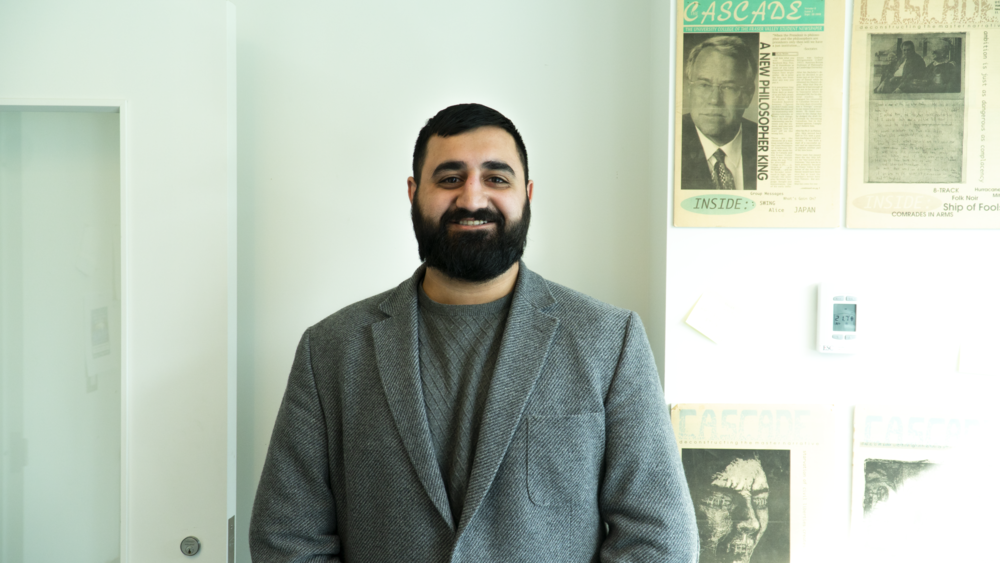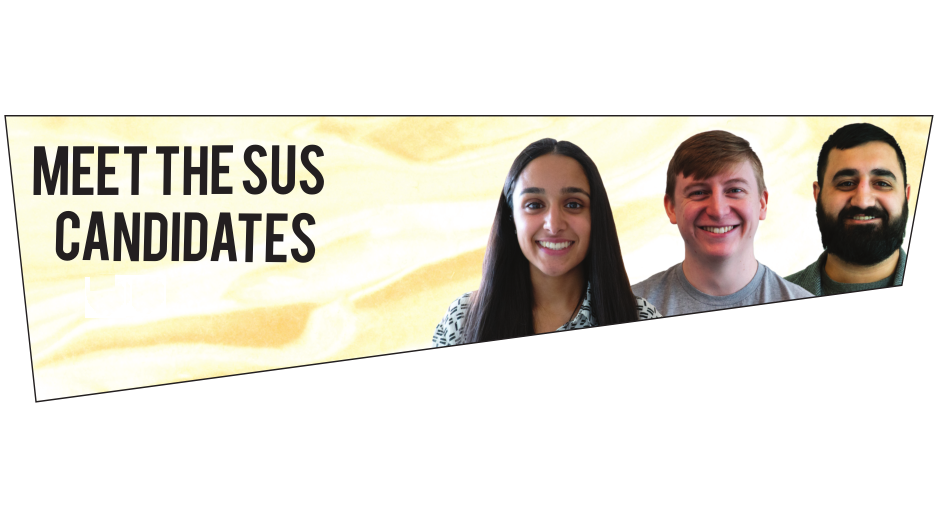Tripat Sandhu — president

How will your experiences and skills help you to fulfill this role?
The role of the president for SUS is basically being the chief executive of the society and being an advocate for the students. At UFV I’m really involved with the campus. Not only am I a student athlete on the soccer team, but I volunteer for a few hours every week with the current president doing tasks that the president needs me to do. I’m a peer supporter for communications for international students and they bring a lot of issues academically which expose me to different issues on campus. Off-campus in the community I run my own nonprofit organization (Sikh Sewa International Society of Youth). My friends and I founded it in when I was in grade 11 and we provide local and international relief to citizens who are in poverty. Right now we’ve done three annual eye camps in India, and now we want to do a dental camp in the upcoming winter.
So SUS is also a nonprofit organization. Just being in a leadership position and collaborating with different organizations, I’ve had a lot of experience which I can transfer to being president of SUS.
What would you say is or should be SUS’s main mission?
To make decisions that benefit students.
What I mean by this is that executives shouldn’t just have a personal agenda that they want to complete, but they should have an agenda that appeals to the students and actually benefits them, because we’re supposed to be the voice for the students and trying to make this university more engaging.
How would you look to promote collaboration with other programs within the university?
When I say that I want other groups and associations, clubs and associations collaborating with us, I mean that we host events together, and we use teamwork and allot the resources and finances among each other so we can save time and have a better event that is more popular among a larger audience of students. Examples are having one orientation together; maybe SUS and all the other organizations that want to pitch in for an orientation, we can do it together. Or just having a sports day — maybe Student Life, SUS, and UFV Rec can do it together.
Why do you think that this type of collaboration isn’t currently happening?
From what I’ve experienced, it’s been a lot of headbutting and competition and trying to one up each other with events, and just trying to promote your own organization. But instead I feel like everyone can do it together and all get the benefit at the end of the day.
What about SUS as an organization would you look to improve/change?
One thing is transparency. I want students to know exactly where funds are going. Over the past few years some funds have not been disclosed to a lot of clubs and associations because I’ve [heard] a lot of complaints about that. I want more transparency and less hiding secrets from students because, after all, it is for students.
Another thing I would change is the way that things are marketed. I want emails to be less overloaded and just with important information that students want to look at. Because I’ve heard one too many times that students just delete every SUS email there is, and I want to change that.
Thomas Cohen — vice president students

How will your experiences and skills help you fulfill this role?
That’s a bit of a tricky question. It’s been an incredibly hard learning curve applying for this position. I didn’t know a lot about SUS before, but I think I’ve learned a lot in the [last] couple of weeks. But I don’t have a lot of professional experience that pertains to this position, exactly. What I will say is that I’m a people person. I’m very personable, friendly, approachable, and I have a lot of friends and family that are either part of a minority groups or they suffer from autism or depression. I have a lot of life experience that I think I could bring to this role.
I’m [also] part of the collegiate league team here; I’m team captain. I have to wrangle people left and right. You know, like, “Hey, we have a game tomorrow. We’re all going to meet up at here to get on this bus and go to this game,” et cetera. So I think wrangling people, you know, making sure things run smoothly is one of my strengths.
What type of programming do you think SUS is lacking right now?
I think SUS in particular is lacking a lot of mental health action campaigning. There has been a lot of campaigning the last few years about making sure people understand what this is, make sure there’s less stigma against people that suffer from mental health issues, but there’s never been a set of events that deal with it that actually promotes like, “Hey, if you’re suffering from this, here’s where you go to get help.” This is the next step of the plan. So that’s, I think, one of the biggest sets of events that I want to focus on.
How would you encourage student engagement in events like this?
That’s one of the biggest problems that we have when relating to the student body. Not necessarily plans for SUS, events moving forward, but just general involvement from other people. I think one of the biggest problems that the student body faces when trying to come to SUS events is that (a) they don’t know what’s going on, (b) they don’t think it’s going to be fun, and (c) their friends aren’t going. So if we tried to gamify some of the events, not the serious ones, but if we make it more fun, perhaps offer prizes, things that want people want to show up for, then we’ll get student engagement and people will start talking to their friends, their family, like, “Hey, I went to this event. It was really, really fun.” Then it’ll spread like that and then more serious events come along and they’re like, “This actually sounds really cool. Maybe we can go to this.”
Is there anything in the past that SUS has done that you would have done differently, or believe could have been done differently?
I think it was a big problem with the orientation that recently happened, when Student Life did their own and SUS did their own as well, and it just seems kind of asinine. Like, why? If people are doing the same thing, you should work together; that’s pretty much my idea. Even if you have differing viewpoints, if you pull your resources, you’ll probably get both done instead of going 75 per cent on one way and 50 per cent on the other. I’m not saying that UFV and Student Life should just be merged, because obviously they have different ideals, but if there’s a chance for common ground. It’s kind of shooting yourself in the foot if you don’t step on it.
How will you look to increase collaboration between SUS and the university?
That’s also a bit of a tricky one since I don’t know the behind-the-scenes workings, but if there are problems between the SUS and another entity, say it’s the UFV OReg board, and people can’t come to orientation so there’s problems going on. People don’t understand because maybe they’re from another country or they don’t speak English as a second language. If there are financial issues, like we can’t afford an interpreter or translator, then we should definitely talk to UFV about that or they could talk to us.
I can’t express how important it would be if everybody was working together on the same page. We have such a power house right across the green from us. Why can’t we be friends, you know?
Gurvir Gill – vice president external

How will your experiences and skills help you to fulfill this role?
My experiences over the past few years with the university have focused on working with students and for students. The last two years I did serve as president so part of that role is the public relations component. I think having that experience in this role as being the major spokesperson, but now moving into a role that focuses on the federal government, municipal government, and even on campus, the skills that I have learned during my presidency will help me to move into that role and be more targeted to things that I like and want to do in school.
What would you do to increase transparency and communication with the student body?
I think something that will help transparency and communication to the members would be more communication out there. As a candidate, something I would like to do is really increase the amount of information we pump out to our members. We do have emails, but I think more tabling and other little things throughout the semester would be good, as well as social media; I know we do a good job on Facebook, but other platforms as well. I think that would be a good way to engage this up-and-coming tech generation that will be our newest members coming in. And the amount, I don’t mean like now we do it five times so let’s do it 10 times, but more in depth with our members and diving into projects and press releases; I think that is something we started doing this past year, but just continuing that trend.
How will you look to make tangible changes with your advocacy work around the university?
I think making tangible changes with the university is both what students see visibly and things behind the scenes. I know some of the discussions in the past would be looking into a fall reading break, looking into group study policies, sexualized violence policies — some of these things where students may not see all the work that goes behind the scenes. But when they are implemented they will see more of the effect.
Like if we had a fall reading break I am sure everyone would see the reality, the change of that, because they would physically get days off in the fall semester. Whereas a lot of that work is research, meetings with the university, more behind the scenes. Same with policies: more developing and implementing a group study policy. One of the biggest things you would see students kind of cringe toward is group projects. Students are not strongly fond of group projects, so one of those things is looking to better protect students and their individual work when in group scenarios. So working with the university and administration for things like that on campus as well as other big changes that they may see. Working with the president at the university, in the cities, to bring in the Fraser Valley Express. I know that is something that has been mentioned in the past and something I would love to help be a part of moving forward, because that is another big, tangible, visible change students can see.
What do you think is a priority issue that UFV students want SUS to advocate for?
I think the priority would be somewhat around the class schedule and how it works at UFV … I think the first major issue that I have heard is lining up the class schedule and the exam schedule so students know the day you have classes will be the day you have exams at the same time. No shuffling your work schedule or the rest of your life — because students are juggling so many different things — but those last two weeks it’s trying to get days off from work and other things that they may not have pre-planned because their exams are on different times. Maybe just lining that up has definitely been a thing that I have heard over the years but I think that would be something good to advocate on.
How do you keep your finger on the pulse of what you think students want? How do you know what UFV students want to see changes in?
Something I would like to see and get done is doing surveying … Moving forward, I think something big would be surveys to ask the membership every now and then that’s like, “Hey, what would be some of your advocacy priorities?” Because I know as an organization there may be something on the agenda or something someone ran on as a platform, but throughout the year you may say, actually, that idea may not work, or there are some logistical problems, so we need a platform or system in place where we could get better communication with our members giving us feedback on certain ideas or topics.
Kimberley Hunter – vice president students
How will your experiences and skills help you to fulfill this role?
I know that I haven’t been around the block for very long, but I personally feel like I have the passion and the drive to do the best for SUS. For my own skills, I have worked with not-for-profit organizations before and currently, so I have an idea of where to budget, and what kind of events should be planned, how it should be planned, and also who our target audience is.
What kind of programming do you think SUS is lacking right now?
I think that SUS is lacking in more cultural events and also ones that can help our student body progress forward after graduating and while in school.
Is there anything in the past that SUS has done that you would have done differently, or believe could have been done differently?
No comment.
What would you do to increase student engagement with SUS events?
I think we should be changing our marketing standpoint. We do a lot of marketing already just on Facebook and on posters. I think that we should also put up some signs around campus aside from posters, just so then students are aware that this is happening during the week, if not tomorrow.
How will you look to increase collaboration between SUS and the university?
Can you elaborate on the question?
If SUS and the university don’t see eye to eye on an issue, how would you go about collaborating with the university?
I know when it comes to collaboration, both sides should gain something from it. My hope is that when we do collaborations with UFV that they will be able to see what they’re actually gaining from it, even if there is a bit of a disagreement. I feel that we should definitely just be taking things in stride. One step at a time is also a big thing; I feel like sometimes we may rush into things, but a lot of the time it’s a lot of careful planning and I feel like if we can give as much data and as much information to the university, in that way, it just doesn’t look like one organization is gaining something — everyone is gaining something from that.
Jaleen Mackay – president
Jaleen Mackay declined an interview for this article.
“I have no confidence that The Cascade will report my words truthfully, accurately, or in good faith,” Mackay said over email, when asked for an official statement.
Andrew Stahl – college of arts representative
Andrew Stahl did not respond to the request for an interview. There was no contact email available in Stahl’s candidate statement, and the candidate did not respond to an email sent to their student email. The SUS chief electoral officer Kristina Anderson was unable to provide contact information for the candidate due to privacy restrictions.


